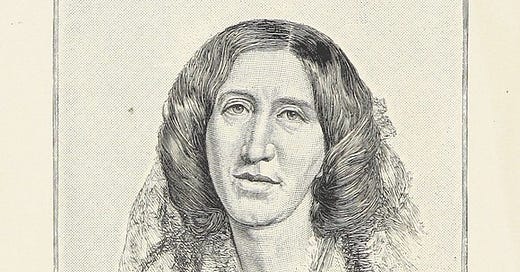I’ve reached the enough-research-already stage with my current project. Oh, I could keep going, and going, and going. Once you start diving into the history of material culture and humanity’s vexatious relationship with stuff, you never reach the bottom. Time to swim for the surface and hope to bring up a few treasures from the deep.
Helping me to let go of the compulsion to drown in more research is the specter of the Rev. Edward Casaubon, probably the most loathed character in George Eliot’s Middlemarch. (N.B. Not everybody dislikes him.) I first read the book in graduate school, when I was in my mid-20s, with all the time in the world (or so I thought) to read big novels and think big thoughts about them. I made it through Middlemarch, underwhelmed if duly impressed by Eliot’s stamina in pulling together the threads of so many lives.
Books reread their readers. Middlemarch turns out to be a more compelling read when you have a few decades of life behind you. I picked it again a few years ago out of a sense that I hadn’t been fair to it the first time, and found it an altogether different book. (Rebecca Mead wrote a whole book about re- and rereading Eliot’s blockbuster at different stages of her own life.)
Both of my encounters with Eliot’s study of provincial hopes, thwarted dreams, and hard-won contentment left me shuddering over the dismal Casaubon. His doomed attempt to compile the “Key to All Mythologies” withers him and nearly destroys his passionate and intellectually lively wife, Dorothea Brooke. (Thank goodness for the brooding but animated Will Ladislaw.)
Casaubon endures as a cautionary tale for any writer or scholar who doesn’t know when to say enough is enough. A thing is worth only so much time, as a colleague of mine at the Washington Post Book World used to say. Know when you have enough material to finish the dang book.

As I work toward my January book deadline, though, I’m keeping in mind a different sort of cautionary tale: Dr. Naomi Wolf’s travails with her most recent book, Outrages: Sex, Censorship, and the Criminalization of Love. As was widely reported at the time, her U.S. publisher, Houghton Mifflin, cancelled its edition after a BBC interviewer, Dr. Matthew Sweet, called Wolf out on a major historical misinterpretation, the kind that makes writers of research-based nonfiction grow cold and tremble. What if I get it badly wrong?
That fear can be useful. Somewhere between Rev. Casaubon and Dr. Wolf lies a sweet spot of solid, confident research—enough to build a strong argument without stifling writer or reader. Do the work, check it, check it again (fact-checking’s on us, fellow authors, not our publishers), and get it done.
Thanks for reading!
Cheers,
Jen
Image credit: Portrait of George Eliot from "The complete poetical works of George Eliot. Family edition. Fully illustrated with new wood-engravings. With border by J. D. Woodward,” 1888. Found in the British Library’s wonderful Flickr collection of public-domain images.
Links worth your time:
1) Somebody’s hiding the books they don’t want people to read at an Idaho public library, and an author has a plan to strike back.
2) Three cheers for student journalists who are stepping up to fill the void in local news coverage. (H/t Lee Gardner)
3) The student journalists at The Daily Northwestern got heat for how they covered campus protests—then got heat for apologizing for it. (Note to professional journos and media commentators: Be kind to student journalists. They’re the future of the profession, and a lot of the time they do it as well as or better than we do.)
4) The smell(s) of old books might help conservators preserve them.
5) This (actually pretty interesting) review-essay about Dorothy L. Sayers’ “overlooked” novel Gaudy Night provoked a lot of commentary about how, uh, the book is anything but overlooked.
6) Shake up your Thanksgiving routine with a 17th-century recipe for “Pumpion Pie.”
P.S. Please enjoy this picture of my rain garden, which is looking lovely and autumnal this week.



